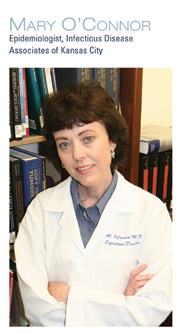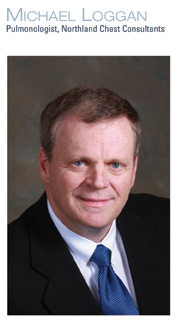
Perhaps the chief paradox at work in a hospital is that, while the mission remains restoration of patients’ health, constant vigilance is required to control conditions that could spread illnesses among patients, staff and visitors alike. It’s just one challenge that competes for the attention of Mary O’Connor, medical director of infection protection and epidemiology for North Kansas City Hospital. In private practice with Infectious Disease Associates of Kansas City for more than two decades, she also serves at Liberty Hospital and Northland Long-Term Acute-Care Hospital, as well as in the out-patient clinic at the North Kansas City Wound Healing Center.
Her duties present an interesting blend: Nurturing on one end, an attack mentality on the other. “Infectious disease had interested me since medical school,” says O’Connor. “I enjoy solving puzzles and investigation, both important in this field. I must admit I have been drawn to a field where I am usually able to find an effective treatment for my patients’ illnesses.”
A Kansas Citian by birth, she studied medicine and served her internship in Wisconsin. A fellowship in infectious diseases at the University of Kansas Medical Center proved not just career-changing but life-changing: Infectious Disease Associates, she said, “offered the perfect mix of private practice, research, and teaching” and she also met her future husband here. At that point, Kansas City’s hook was set, but the blessings haven’t always been easy to manage: “Probably the biggest challenge in my job is balancing my career and family life,” O’Connor says. “I am married with two daughters and it has not been easy to meet all my obligations at work yet always be available for my family.”
She has also directed an HIV program that at its peak served 600 patients. You sense the loss she experienced after 11 years in that role, “when the clinic was taken over by a new corporation it was closed and we were not allowed to take it over,” she says. One of the joys of life as a physician, she says, is learning something new. “I’ve always enjoyed those cases where the diagnosis has been a complete surprise or something I had never seen
in my career. The beauty of this field is that, even after all these years, these types of cases still come along.”

Pulmonology drew Michael Loggan, he says, because it seemed the best opportunity to take care of what he calls the “sickest of the sick.” He couldn’t have known early on that those skills would one day produce a heart-breaking finding in his own father.“He died of lung cancer in the ’90s, a diagnosis that I had the misfortune of making initially,” Loggan wistfully recalls. Over a long career as a businessman and electrictian, his father was
constantly exposed to insulation in old buildings, probably even asbestos, Loggan says. “Nevertheless, he fought one of the diseases I see regularly for 2½ years before succumbing.”
Loggan is in private practice with Northland Chest Consultants and serves on the staff at Liberty Hospital and North Kansas City Hospital, as well as Northland Long-Term Acute-Care Hospital, where he is medical director.
His specialties are pulmonary care, critical care and sleep disorders.
A Lawrence native and graduate of the University of Kansas and its medical school, Loggan was recruited to Liberty Hospital 20 years ago and decided he had found a home.
Today, he says the biggest challenge he faces is balancing advances in medical technology with patients’ needs as they exhibit more advanced and serious illnesses. “We can almost always seem to keep someone alive longer,” he says philosophically, “so when do we apply that technology and when do we evaluate the bigger question of quality of life vs. life support artificially?”
Mentors played a key role in leading him to this point in his career, and he singles out the influences of physicians Gerald Kerby and William Ruth, but he also says, “Clearly, I would not be here without support from my wife of 24 years, Luanne,” with whom he’s raised two more Jayhawks.
And he pays tribute to one other figure: “My father’s advice was also very helpful,” Loggan says, “and I miss him greatly.”